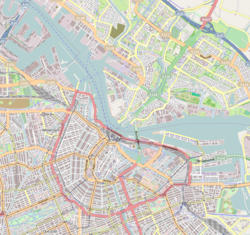EYE Film Institute Netherlands
 EYE Film Institute Netherlands in 2012 | |
 Location in Amsterdam | |
| Established | 1952 (1952) |
|---|---|
| Location | IJpromenade 1, Amsterdam, The Netherlands |
| Coordinates | 52°23′04″N 4°54′02″E / 52.384411°N 4.900594°E / 52.384411; 4.900594Coordinates: 52°23′04″N 4°54′02″E / 52.384411°N 4.900594°E / 52.384411; 4.900594 |
| Type | Film archive National museum Art museum History museum |
| Collection size | 820,000 objects |
| Public transit access | North exit of Amsterdam Central Station, ferry across IJ |
| Website | eyefilm.nl |

Collection building of EYE Film Institute Netherlands, Asterweg, Amsterdam.
EYE Film Institute Netherlands is a Dutch archive and museum in Amsterdam that preserves and presents both Dutch and foreign films screened in the Netherlands. The museum collection includes 37,000 film titles, 60,000 posters, 700,000 photographs and 20,000 books. The earliest materials date from the start of the film industry in the Netherlands in 1895.
Contents
1 Location and history
2 Projects
3 Collection
4 See also
5 References
6 External links
Location and history
EYE is located in the Overhoeks neighborhood of Amsterdam in the Netherlands. It includes a cinematography museum formerly called Filmmuseum, founded in 1952. Its predecessor was the Dutch Historical Film Archive, founded in 1946. The Filmmuseum was situated in the Vondelparkpaviljoen since 1975. In 2009, The Nederlands Filmmuseum merged with Holland Film, the Netherlands Institute for Film Education and the Filmbank[1] and plans were announced for a new home on the north bank of Amsterdam's waterfront, just behind the Central Station and connected to it by a free ferry.[2] It was officially opened on April 4, 2012 by Queen Beatrix.[3][4]
The EYE building was designed by Delugan Meissl architects,[5] which specializes in buildings that appear to be in motion, e.g., the Porsche Museum in Stuttgart.[6]
Projects
EYE is performing a major film digitization and preservation project together with IBM and Thought Equity Motion, a provider of video platform and rights development services. The project involves scanning and storing more than 150 million discrete DPX files on LTO Gen5 Tape in the Linear Tape File System format.[7]
Collection
 Play media
Play media
The Adopted Brother by Christy Cabanne and D.W. Griffith. Silent film, 1913. Running time: 10:41
 Play media
Play media
Charlie in Turkey, silent animation by Pat Sullivan, 1916. 9:39
 Play media
Play media
Flight tests with the helicopter Pescara 2R of Raúl Pateras Pescara. Silent film 1922. 1:25.

Poster by Cândido de Faria for the silent Pathé Frères film Les Vampires de la côte, 1908

Nieuw Weekblad voor de Cinematografie 1, 6 oktober 1922. Dutch weekly of cinematography.

Filmstar Lilian Harvey by Alexander Binder, 1920's

Filmstar Truus van Aalten by Alexander Binder, 1920's

Filmstar Greta Garbo by Alexander Binder, 1920's

Film restoration
See also
- List of film archives
- Association of European Film Archives and Cinematheques
- List of museums in Amsterdam
References
^ "Nederlands Filmmuseum (NFM)". filmarchives online. Retrieved April 21, 2018..mw-parser-output cite.citation{font-style:inherit}.mw-parser-output q{quotes:"""""""'""'"}.mw-parser-output code.cs1-code{color:inherit;background:inherit;border:inherit;padding:inherit}.mw-parser-output .cs1-lock-free a{background:url("//upload.wikimedia.org/wikipedia/commons/thumb/6/65/Lock-green.svg/9px-Lock-green.svg.png")no-repeat;background-position:right .1em center}.mw-parser-output .cs1-lock-limited a,.mw-parser-output .cs1-lock-registration a{background:url("//upload.wikimedia.org/wikipedia/commons/thumb/d/d6/Lock-gray-alt-2.svg/9px-Lock-gray-alt-2.svg.png")no-repeat;background-position:right .1em center}.mw-parser-output .cs1-lock-subscription a{background:url("//upload.wikimedia.org/wikipedia/commons/thumb/a/aa/Lock-red-alt-2.svg/9px-Lock-red-alt-2.svg.png")no-repeat;background-position:right .1em center}.mw-parser-output .cs1-subscription,.mw-parser-output .cs1-registration{color:#555}.mw-parser-output .cs1-subscription span,.mw-parser-output .cs1-registration span{border-bottom:1px dotted;cursor:help}.mw-parser-output .cs1-hidden-error{display:none;font-size:100%}.mw-parser-output .cs1-visible-error{font-size:100%}.mw-parser-output .cs1-subscription,.mw-parser-output .cs1-registration,.mw-parser-output .cs1-format{font-size:95%}.mw-parser-output .cs1-kern-left,.mw-parser-output .cs1-kern-wl-left{padding-left:0.2em}.mw-parser-output .cs1-kern-right,.mw-parser-output .cs1-kern-wl-right{padding-right:0.2em}
^ "EYE Film Institute in Amsterdam". Amsterdam.info. Retrieved April 21, 2018.
^
Teffer, Peter (April 12, 2012). "Once Unfashionable, Noord District of Amsterdam Gains Cachet". The New York Times. Retrieved April 25, 2012.Much of the river’s north bank has been transformed in recent years, and the EYE Film Institute Netherlands stands out, a museum that Queen Beatrix opened officially on April 4.
^ Joel Weickgenant, "A New Home for Film in Amsterdam", The New York Times, November 10, 2009
^ Delugan Meissl, article in German Wikipedia
^ "EYE Film Institute Amsterdam", Architectural Digest blog, May 2012
^ IBM Press Release
External links
| Wikimedia Commons has media related to EYE Film Institute Netherlands. |
- Official website








